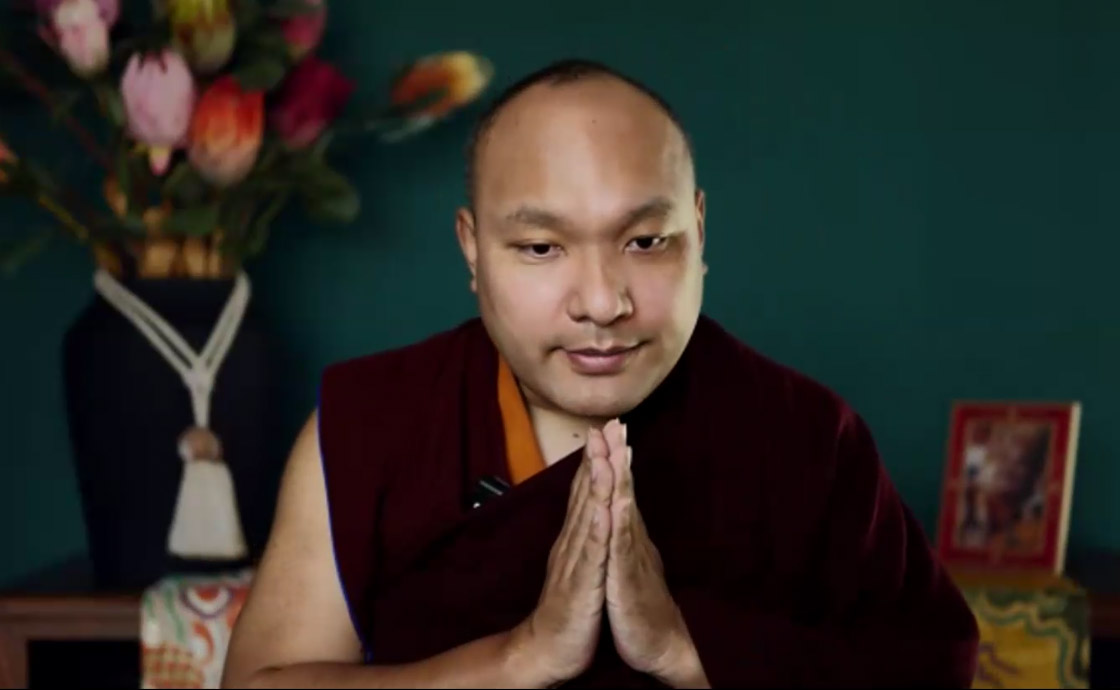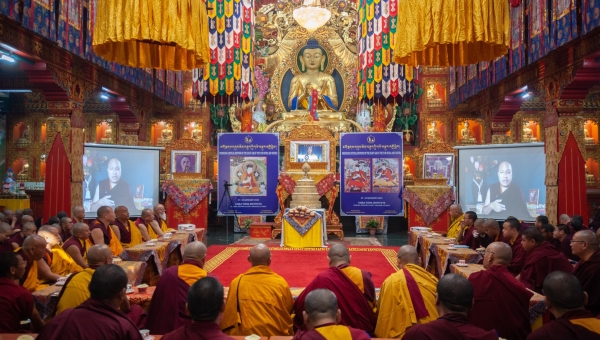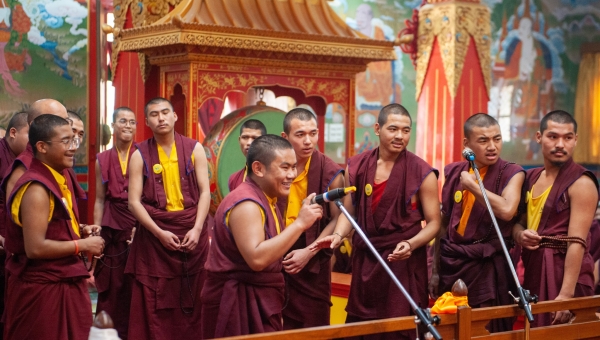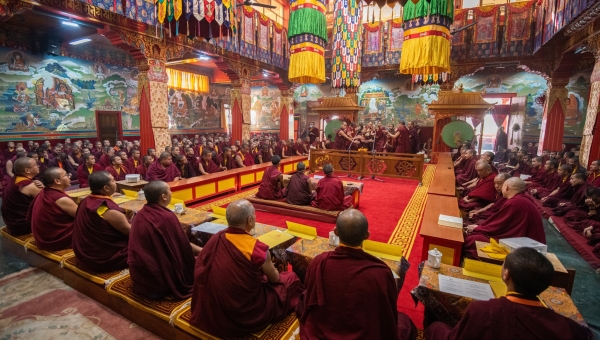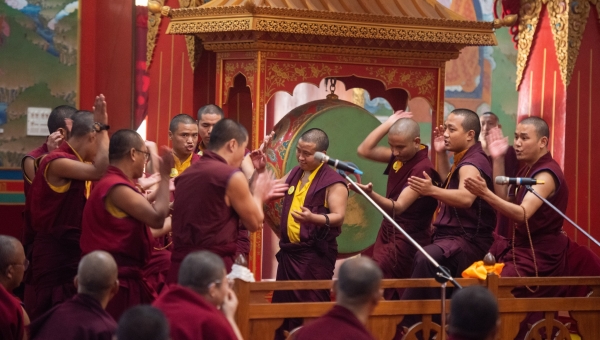The Kagyu Gunchoe Conference— Providing Critical Editions of the Eight Great Texts of Sutra and Tantra: Day Two
28 January 2025
༄༅། །དཔལ་མཉམ་མེད་འགྲོ་མགོན་བཀའ་བརྒྱུད་པའི་དགུན་ཆོས་ཆེན་མོ་ཐེངས་ཉེར་ལྔ་པའི་ཉིན་ཉེར་དགུ་པ། བཛྲ་བིདྱཱ་གཙུག་ལག་སློབ་གཉེར་ཁང་། དཔལ་༧རྒྱལ་བའི་དབང་པོ་༧ཀརྨ་པ་བཅུ་བདུན་པ་ཆེན་པོ་མཆོག་གིས་འཛོམས་དྲ་རྒྱ་ཐད་གཏོང་དབུ་བཞུགས་མཛད་དེ། རྒྱ་བལ་འབྲུག་གསུམ་གྱི་བཤད་གྲྭ་ཁག་གི་མཁན་པོ་དང་སློབ་དཔོན་དང་བཤད་གྲྭ་བ་རྣམས་ཀྱིས། མདོ་སྔགས་གཞུང་ཆེན་བརྒྱད་ཀྱི་དཔེ་བསྡུར་བགྲོ་གླེང་མཛད་བཞིན་པ་ཉིན་གཉིས་པའི་བརྙན་པར་ཕྱོགས་བསྡུས་དགེའོ། །
Details of the schedule on the second day of the conference
The conference began at 10 am with chanting praises to Manjushri. Khenpo David Karma Choephel chaired the conference, and the Gyalwang Karmapa participated by video link.
Representatives from each of yesterday’s six discussion groups presented the results to His Holiness the Gyalwang Karmapa. His Holiness then delivered an address on “Producing Critical Editions of the Eight Great Texts on Sutra and Tantra”, with a special focus on the “Three Great Tantra Texts” and their deep connection with the third Gyalwang Karmapa, Rangjung Dorje. The first session concluded at 11:15 AM.
The second session began at 2:00 PM with committee discussions, followed by a tea break at 3:30 PM.
At 4:00 PM, participants gathered for a final group discussion to summarize the outcomes of the day. Thoughts and ideas were shared on collaborative efforts toward producing critical editions of the Eight Great Texts on Sutra and Tantra in the future.
Details of the Gyalwang Karmapa’s Address to the Conference
His Holiness Gyalwang Karmapa began by extending warm greetings to all participants of the 25th Kagyu Gunchoe. He also highlighted the significance of tomorrow being the Chinese New Year and conveyed his best wishes for a joyful and prosperous year ahead.
He expressed appreciation for the productive discussions held so far, noting that some of the opinions shared have been especially insightful and helpful.
He then introduced the focus of the day’s teachings, transitioning from the previous day’s discussion on the “Five Great Philosophical Texts” to the “Three Great Texts on Mantra”, which include: The Profound Inner Meaning, Sublime Continuum and Uttara Tantra.
“The title སྣང་རྟག་རྒྱུད་གསུམ (Three Great Tantras) is challenging to date precisely, but it is mentioned in Panchen Shakya Chokden’s Chöjung (History of Dharma) that the title originated with the 3rd Karmapa, Rangjung Dorje.
Panchen Shakya Chokden, a contemporary of the 7th Karmapa, Chödrak Gyatso, had a close relationship with him. By the 7th Karmapa’s request, he composed works like Ume ChöJung (History of Madhyamaka) and Tséma’i Chöjung (Valid Cognition). These texts include many teachings relevant to the Kagyu lineage, particularly the Karma Kamtsang tradition. The 9th Karmapa, Wangchuk Dorje, also emphasized the importance of studying the Eight Great Texts—both those on Sutra and Mantra—as a duty to preserve them for future generations.
Key Points on the Three Great Texts: The Profound Inner Meaning was composed by the 3rd Karmapa himself. The Sublime Continuum (Uttaratantra): while it has many commentaries, the Kagyu tradition focuses primarily on Rangjung Dorje’s commentary. Uttara Tantra: The Kagyu school’s Shentong interpretation of this text stems from the 3rd Karmapa.
Rangjung Dorje exemplified the four essential qualities required to compose a treatise. In the broader context, the 1st Karmapa, Düsum Khyenpa; the 2nd Karmapa, Karma Pakshi; and the 3rd Karmapa, Rangjung Dorje, hold particular importance in the Karmapa lineage: Düsum Khyenpa established the Black Crown tradition; Karma Pakshi spread the fame of the Karmapa name; and Rangjung Dorje became the first widely recognized reincarnation (Tib. tulku)
The teachings that originate from Marpa and his esteemed disciples hold great significance, and it is our responsibility to preserve them for future generations.
It is essential to cultivate both study (བཤད་པ་) and practice (སྒྲུབ་པ་), ensuring a balanced approach to Dharma. By integrating deep learning with diligent practice, we uphold the authentic transmission of these profound teachings.”











